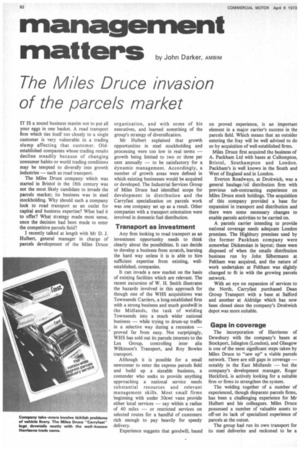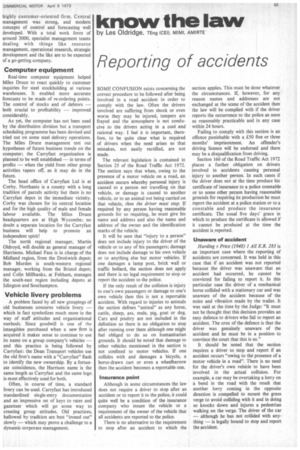management
Page 64

Page 65

If you've noticed an error in this article please click here to report it so we can fix it.
matters by John Darker, AM B M
The Miles Druce invasion of the parcels market
IT IS a sound business maxim not to put all your eggs in one basket. A road transport firm which ties itself too closely to a single customer is very vulnerable in a trading slump affecting that customer. Oldestablished companies whose trading results decline steadily because of changing consumer habits or world trading conditions may be tempted to diversify into growth industries — such as road transport.
The Miles Druce company which was started in Bristol in the 18th century was not the most likely candidate to invade the parcels market; its business was in steel stockholding. Why should such a company look to road transport as an outlet for capital and business expertise? What had it to offer? What strategy made most sense, once the decision had been made to enter the competitive parcels field?
I recently talked at length with Mr D. J. Hulbert, general manager in charge of parcels development of the Miles Druce
organization, and with some of his executives, and learned something of the group's strategy of diversification.
Mr Hulbert explained that growth opportunities in steel stockholding and processing were too low in real terms — growth being limited to two or three per cent annually — to be satisfactory for a dynamic management. Accordingly, a number of growth areas were defined in which existing businesses would be acquired or developed. The Industrial Services Group of Miles Druce had identified scope for development in distribution and the Carryfast specialization on parcels work was one company set up as a result. Other companies with a transport orientation were involved in domestic fuel distribution.
Transport as investment
Any firm looking to road transport as an investment opportunity needs to think clearly about the possibilities. It can decide to develop a business from scratch, learning the hard way unless it is is able to hire sufficient expertise from existing, wellestablished, companies.
It can invade a new market on the basis of existing facilities which are relevant. The recent excursion of W. H. Smith illustrates the hazards involved in this approach for though one of the WHS acquisitions was Townsends Carriers, a long-established firm with a strong business and much goodwill in the Midlands, the task of welding Townsends into a much wider national business — while trying to drum-up traffic in a selective way during a recession — proved far from easy. Not surpripingly, WHS has sold out its parcels interests to the Lex Group, controlling inter alia Wilkinson's Transport, and Roy Bowles transport.
Although it is possible for a small newcomer to enter the express parcels field and build up a sizeable business, a contender who seeks to provide anything approaching a national service needs substantial resources and relevant management skills. Most small firms beginning with under 30cwt vans provide either local services — say within a radius of 40 miles — or restricted services on selected routes for a handful of customers rich enough to pay heavily for speedy delivery.
Experience suggests that goodwill, based on proved experience, is an important element in a major carrier's success in the parcels field. Which means that an outsider entering the fray will be well advised to do so by acquisition of well-established firms.
Miles Druce first acquired the business of A. Packham Ltd with bases at Cullompton, Bristol, Southampton and London. Packham's is well known in the South and West of England and in London.
Everton Roadways, at Droitwich, was a general haulage foil distribution firm with previous sub-contracting experience on Miles Druce stock holdings. The acquisition of this company provided a base for expansion in transport and distribution and there were some necessary changes to enable parcels activities to be carried on.
A parcels carrier intending to provide national coverage needs adequate London premises. The Highbury premises used by the former Packham company were somewhat Dickensian in layout; these were disposed of when the smalls distribution business run by John Silbermann at Feltham was acquired, and the nature of work undertaken at Feltham was slightly changed to fit in with the growing parcels network.
With an eye on expansion of services to the North, Carryfast purchased Dean Group Transport with a base at Salford and another at Aldridge which has now been closed since the company's Droitwich depot was more suitable.
Gaps in coverage
The incorporation of Hitnisons of Dewsbury with the company's bases at Stockport, Islington (London), and Glasgow is one of the most significant steps taken by Miles Druce to "sew up" a viable parcels network. There are still gaps in coverage — notably in the East Midlands — but the company's development manager, Roger Heckford, is actively looking for a suitable firm or firms to strengthen the system.
The welding together of a number of experienced, though disparate parcels firms, has been a challenging experience for Mr Hulbert and his colleagues. Miles Druce possessed a number of valuable assets to off-set its lack of specialized experience of parcels at the outset.
The group had run its own transport for its steel deliveries and reckoned to be a highly customer-oriented firm. Central management was strong, and modern concepts of control and forecasting well developed. With a total work force of around 3000, specialist management teams dealing with things like resource management, operational research, strategic development and the like are to be expected of a go-getting company.
Computer equipment
Real-time computer equipment helped Miles Druce to react quickly to customer inquiries for steel stockholding at various warehouses. It enabled more accurate forecasts to be made of re-ordering points. The control of stocks and of debtors — both crucial to profitability — improved considerably.
As yet, the computer has not been used by the distribution division but a transport scheduling programme has been devised and tried out on some steel delivery operations. The Miles Druce management test out hypotheses of future business trends on the computer; the Carryfast organization is planned to be well established in terms of profits — when the yield from other group activities tapers off, as it may do in the future.
The head office of Carryfast Ltd is at Corby. Northants is a county with a long tradition of parcels activity but there is no Carryfast depot in the immediate vicinity. Corby was chosen for its central location and for the high quality of male and female labour available. The Miles Druce headquarters are at High Wycombe; no doubt a separate location for the Carryfast business will help to promote an independent spirit!
The north regional manager, Martin Oldroyd, will double as general manager of Harrisons. Michael Fass is in charge of the Midland region, from the Droitwich depot; Bob Murden is south-western regional manager, working from the Bristol depot; and Colin Millbanks, at Feltham, manages the south-east region including depots at Islington and Southampton.
Vehicle livery problems
A problem faced by all new groupings of old businesses concerns vehicle livery — which in fact symbolizes much more in the way of staff attitudes and organizational methods. Since goodwill is one of the intangibles purchased when a new firm is acquired it makes sense to continue to use its name on a group company's vehicles — and this practice is being followed by Carryfast: the Dean Transport vehicles use the old firm's name with a "Carryfast" flash to identify the new ownership. By a fortunate coincidence, the Harrison name is the same length as Carryfast and the same logo is most effectively used for both.
Often, in course of time, a standard livery can be used. Carryfast has introduced standardized single-entry documentation and an impressive set of keys to rates and gazetteer which will go some way to creating group attitudes. Old practices, hallowed by tradition are best "ironed out" slowly — which may prove a challenge to a dynamic corporate management.












































































































